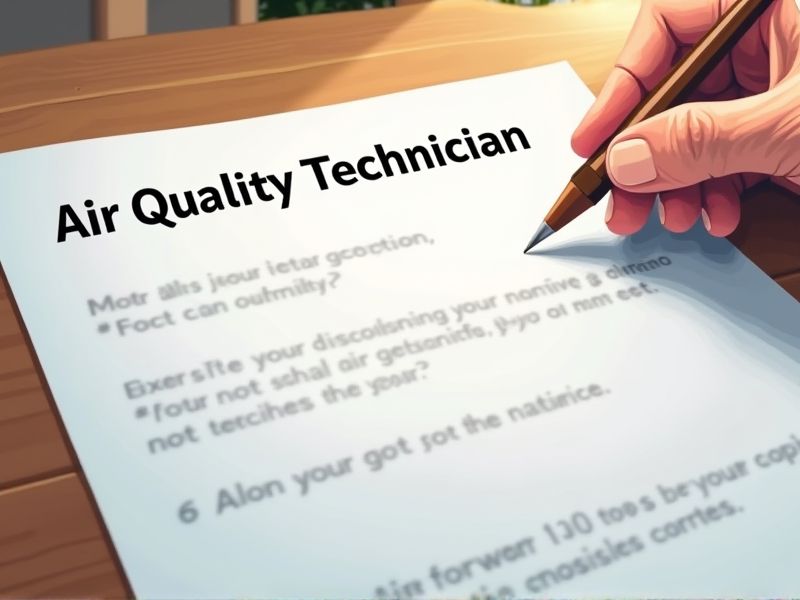
Air quality technicians play a critical role in ensuring environmental standards are met, and this necessitates specific certifications. Regulatory agencies and employers require these certifications to ensure that technicians have the necessary skills to accurately assess and manage air quality. Without these credentials, technicians may lack the credibility and expertise needed to perform their duties effectively. Important certifications needed for an air quality technician include those listed here.
EPA Air Quality Monitoring Technician Certification
Obtaining EPA Air Quality Monitoring Technician Certification ensures that technicians have the standardized knowledge and skills required for accurate air quality assessment. Certification improves the reliability of data collected, which is critical for informing public health and policy decisions. Without certification, inconsistencies in data collection could lead to misinformed regulatory actions. It also enhances professional credibility and career advancement opportunities for technicians in the field.
EPA Laboratory Analysis Certification
EPA Laboratory Analysis Certification ensures air quality technicians can accurately assess and report on environmental pollutants, which is crucial for maintaining public health standards. This certification validates that the technicians have undergone rigorous training and possess the necessary skills to conduct complex analyses. Without such certification, inconsistencies and errors in data collection could lead to unreliable air quality reports, affecting regulatory compliance and public trust. The certification also enhances the technician's credibility, fostering confidence among stakeholders and policymakers in environmental decision-making.
OSHA 30-Hour General Industry Certification
The OSHA 30-Hour General Industry Certification is crucial for air quality technicians because it provides comprehensive training on safety standards, reducing workplace accidents, and ensuring compliance with regulatory requirements. This certification helps technicians identify and mitigate potential hazards related to air quality assessments, such as chemical exposure and equipment handling. Enhanced knowledge from the certification fosters a safer working environment, aligning with industry expectations and employer demands. Employers often require or prefer technicians with this certification to minimize liability and enhance workplace safety standards.
OSHA Respiratory Protection Certification
Air Quality Technicians work in environments where they may encounter hazardous airborne contaminants, and OSHA Respiratory Protection Certification ensures they possess the necessary knowledge to protect themselves effectively. This certification guarantees technicians understand how to properly use, maintain, and inspect respiratory protection equipment, reducing the risk of inhaling harmful substances. Employers are required by OSHA to maintain a safe workplace, making this certification crucial for compliance with occupational safety regulations. This certification can also enhance career prospects by demonstrating a technician's commitment to safety and their proficiency in handling workplace hazards.
Certified Industrial Hygienist (CIH)
Certified Industrial Hygienists (CIH) possess specialized knowledge crucial for accurately identifying airborne hazards that air quality technicians might encounter. Their expertise enables the assessment and implementation of effective control measures, ensuring workplace compliance with safety regulations. The presence of a CIH can reduce health risks associated with exposure to pollutants by actively monitoring and analyzing air quality data. Employing a CIH fosters a safer environment and can lead to decreased incidents of work-related respiratory illnesses.
Certified Indoor Air Quality Professional (CIAQP)
A Certified Indoor Air Quality Professional (CIAQP) provides an air quality technician with a comprehensive understanding of indoor pollutants and their health impacts, which increases the technician's ability to identify and address sources of poor air quality. Certification ensures the technician is equipped with the latest industry standards and regulations, which enhances the reliability of air quality assessments. With CIAQP training, technicians are better prepared to implement effective air purification strategies, leading to healthier indoor environments. Certified professionals also gain credibility in the industry, thus establishing trust with clients seeking expert air quality solutions.
HAZWOPER Certification
Air Quality Technicians frequently encounter hazardous substances that require knowledge contained in HAZWOPER Certification for safe handling and compliance with OSHA regulations. The certification ensures technicians understand the proper procedures and safety protocols for emergency response situations involving airborne contaminants. Without this training, there is an increased risk of improper assessment and response to hazardous conditions, potentially endangering public health and environmental safety. Employers prioritize hiring HAZWOPER-certified technicians to ensure their teams are equipped to manage and mitigate workplace hazards efficiently.
ISO 17025 Laboratory Accreditation Certification
ISO 17025 Laboratory Accreditation Certification ensures that air quality technicians have a standardized framework for reliable and accurate testing methods. Accredited labs demonstrate proficiency in managing and performing tests, increasing trust in their results. Consistent testing methodologies are essential for regulatory compliance and benchmarking air quality standards. Certification also enhances international recognition, facilitating data exchange and collaboration across borders.
Certified Hazardous Materials Manager (CHMM)
An Air Quality Technician often deals with pollutants and hazardous materials, requiring compliance with strict regulations, where a Certified Hazardous Materials Manager (CHMM) can ensure adherence. CHMM certification equips an individual with specialized knowledge in managing hazardous substances, crucial for minimizing environmental impact and human exposure. In the event of a hazardous material incident, a CHMM possesses the expertise to effectively manage and contain risks, ensuring safety and legal compliance. The presence of a CHMM can enhance the credibility and reputation of an organization by demonstrating a commitment to environmental and public health standards.
NICET Environmental Technology Certification
NICET Environmental Technology Certification validates an Air Quality Technician's skillset, ensuring they have the expertise necessary to accurately monitor and assess air quality. Employers benefit from hiring certified technicians, as certification indicates a technician adheres to industry standards and regulations. With increasing regulations and public awareness around environmental health, certification helps technicians stay up-to-date with the latest technologies and methodologies. Certification can enhance job prospects and career advancement opportunities, providing a competitive edge in the labor market.
Summary
By obtaining certifications, you enhance your knowledge and credibility in the field of air quality management. This can lead to better job prospects and potentially higher earnings due to recognized expertise. Employers often prioritize certified technicians, which could result in quicker career advancement and increased job stability. Overall, your certified skills contribute to improved environmental health outcomes, benefiting both communities and ecosystems.
